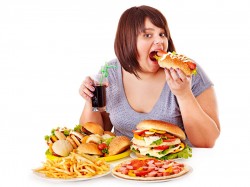Binge Eating Disorder Symptoms
Binge eating disorder is a dangerous mental health disorder marked by eating large amounts of food, frequently, and with no control over quantities or frequencies. Mental health disorders such as binge eating can lead to multiple health risks and are often a sign of underlying issues such as depression, anxiety, or substance abuse.
Unlike bulimia nervosa, people with a binge eating disorder do not try to compensate for their compulsive overeating by vomiting, fasting, or over-exercising. Weight gain or obesity reinforces their negative images of themselves and adds to the guilt and disgust they may feel during and after a binge eating episode. In most cases, the worst a binge eater feels about themselves, the more they will indulge in food for comfort.
Who is at Risk?
Eating disorders frequently appear during the teen years or young adulthood but may also develop during childhood or later in life. Binge eating disorders often occur in late adolescence or early adulthood when mental health stability is vulnerable to outside environmental pressures, but, according to the National Institute of Mental Health, “may also develop during childhood or later in life.” Low self-esteem, loneliness, or dissatisfactions with their body can influence binge eating habits, especially, when they have become accustomed to the comfort of food by their parents during childhood, or have been unsuccessful in previous dieting attempts. Turning to food for comfort and relief is much like becoming addicted to other substances.
What are the Effects?

A person with binge eating problems may eat often when they are feeling stressed or emotional.
Binge eating can cause many physical health problems including; Type 2 diabetes, gallbladder disease, digestive problems, high cholesterol, obesity, high blood pressure, heart disease, and muscle or joint pains.
Emotional stress and instability can lead to other mental health disorders such as insomnia, major depression, anxiety, substance abuse, and suicidal or harmful tendencies.
Binge eating also causes the person to have societal issues such as inability to perform certain activities due to obesity or health problems, isolation from others due to embarrassment, or to hide their habit and this, in turn, increases the risk of mental health problems.
Binge Eating Disorder Symptoms
Emotional and behavioral symptoms are major issues with binge eating disorders and symptoms include:
- Inability to stop eating or to control what is being eaten
- Gorging on food and rapidly swallowing without tasting it
- Eating when not hungry and even when full
- Hiding food to eat in secret
- Eating continuously during the day
- Eating to relieve negative emotions or stress
- Embarrassment and disgust over how much is being eaten
- No amount of food is enough to satisfy the need to eat
- Eating until it is impossible to eat anymore and still wanting to eat more
- Depressed or anxious over eating habits